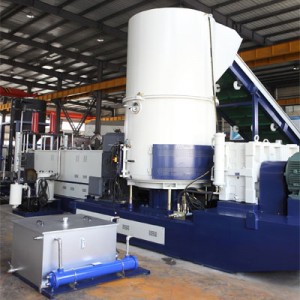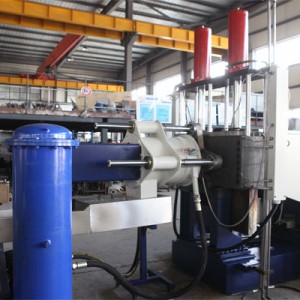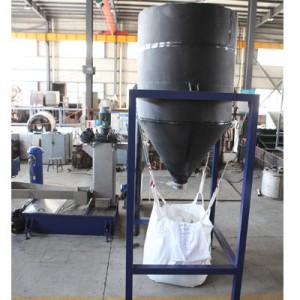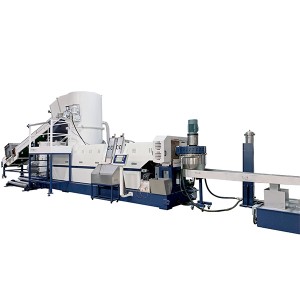Flexiable Laminated Plastic Film Recycling Extruder
In addition to in-house (post-industrial) film waste, the system is also able to process washed flakes, scraps and regrind (pre-crushed rigid plastic waste from injection and extrusion). This equipment is highly recommended for packaging film producers of commercial bags, garbage bags, agricultural films, food packaging, shrink and stretch films, as well as producers in the woven industry of PP woven bags, jumbo bags, tapes and yarns. Other types of material such as PS sheet, PE and PS foam, PE net, EVA, PP mixed with PU are also applicable on this machine


processing materials:






Select Your Model
| Output: 80~120 kg/hr Screw diameter: 75mm TYPE:ML75 |
Output: 150~250 kg/hr Screw diameter: 85mm TYPE:ML85 |
Output: 250~400 kg/hr Screw diameter: 100mm TYPE:ML100 |
| Output: 400~500 kg/hr Screw diameter: 130mm TYPE: ML130 |
Output: 700~800 kg/hr Screw diameter: 160mm TYPE:ML160 |
Output: 850~1000 kg/hr Screw diameter: 180mm TYPE:ML180 |
SPECIFICATION:
| Model Name | ML |
| Final Product | Plastic pellets/granule |
| Machine Components | Conveyor belt, cutter compactor shredder, extruder, pelletizing unit, water cooling unit, drying unit, silo tank |
| Recycling Material | HDPE,LDPE,LLDPE, PP, BOPP, CPP, OPP, PA,PC,PS,PU,EPS |
| Output range | 100kg~ 1000 kg/hr |
| Feeding | Conveyor belt (Standard), Nip roll feeder (Optional) |
| Screw Diameter | 75~180mm (customized) |
| Screw L/D | 30/1,32/1,34/1,36/1 (customized) |
| Screw Material | SACM-645 |
| Degassing | Single or double vented degassing, Unvented for non-printed film (customized) |
| Cutting Type | Hot die face pelletizing (Water ring pelletizer) |
| Cooling | Water cooled |
| Voltage | Customized based on request (For example: USA 480V 60Hz, Mexico 440V/220V 60Hz, Saudi Arabia 380V 60Hz, Nigeria 415V 50Hz...) |
| Optional Devices | Metal detector, Nip roller for film roll feeding , Additive feeder for masterbatch, Centrifuge dryer for drying |
| Delivery Time | 60~80 days for customized machine. In stock machines available |
| Warranty | 1 year |
| Technical Assistance | Engineers available to service machinery overseas |
A plastic recycling and granulating machine is a type of equipment used to recycle plastic waste into granules or pellets that can be reused in manufacturing new plastic products. The machine typically works by shredding or grinding the plastic waste into small pieces, then melting and extruding it through a die to form pellets or granules.
There are different types of plastic recycling and granulating machines available, including single-screw and twin-screw extruders. Some machines also include additional features such as screens to remove impurities from the plastic waste or cooling systems to ensure the pellets are solidified properly. PET bottle washing machine, PP woven bags washing line
Plastic recycling and granulating machines are commonly used in industries that generate large amounts of plastic waste, such as packaging, automotive, and construction. By recycling plastic waste, these machines help reduce the environmental impact of plastic disposal and conserve resources by reusing materials that would otherwise be discarded.














